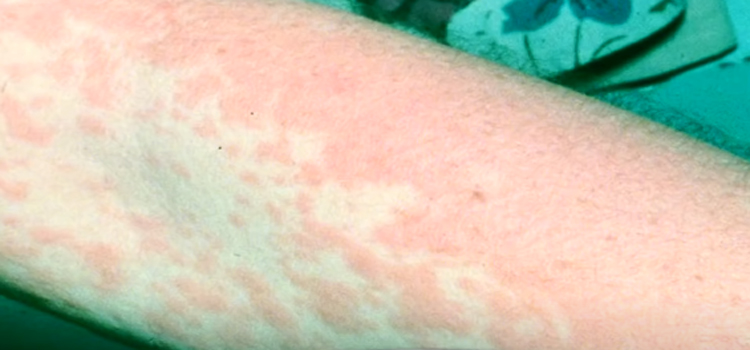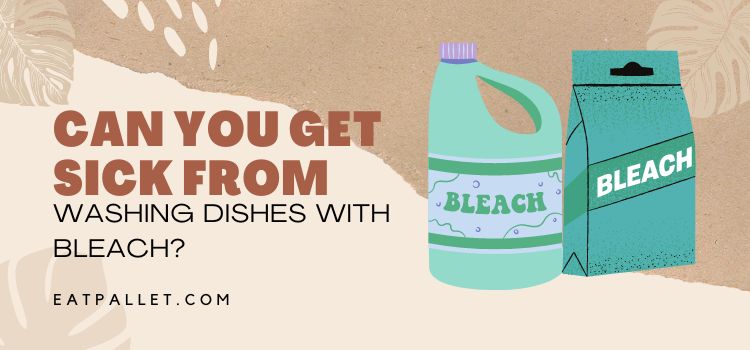Last Updated on September 11, 2024 by Shari Mason
In regards to successful disinfection and eradication of germs, bleach is a common solution for many individuals. However, have you ever considered the potential negative effects of using bleach to wash dishes? Is it truly safe to use bleach for dish cleaning purposes?
Unfortunately, washing dishes with bleach can be more dangerous than you might think. If you want to learn more, read on.
Will You Get Sick From Washing Dishes With Bleach?


Yes, you can get sick if you wash dishes with bleach.
When used for washing dishes in soapy water, bleach provides an additional layer of disinfection. However, since bleach contains toxic and harmful chemicals like sodium hypochlorite solution, it can be dangerous to your health.
To clean and remove surface debris, regular dish soap and warm water will do just fine.
Moreover, you should never mix bleach with your dish soap or other cleaning agents. It’s best to make a bleach/water solution to soak dishes in to be safer.
Dangers of Using Bleach
It Can Harm Your Eyes
Using bleach in washing dishes can cause eye irritation. A chemical burn, including temporary or permanent vision loss, pain, redness, and swelling, can result from even a small amount of bleach getting into your eye.
We suggest removing your contact lenses (if any) and flushing your eyes thoroughly with the cleanest water for at least 15 minutes if you get bleach splashes. But how do you clean a knife after cutting chicken?
It May Affect Your Lungs
What’s your average dishwashing frequency? Three times a day? At the end of each day? Then you should take note it can have adverse effects using bleach frequently. It has been discovered that bleach contributes significantly to the unhealthy air quality inside your home.
According to a study at Harvard, using bleach can increase your chance of developing lung disease, even if you use it once a week. So, there’s no reason to put your lungs at risk when there are better options.
Your Skin Can Be Irritated


While the skin does an excellent job of getting out unwanted microbes, it can quickly reach its limits when exposed to harsh chemicals. So avoid letting bleach come into contact with your skin as much as possible.
Bleach dissolves dead cells and oils on your skin quickly because of its high alkalinity (pH of 12.5). That’s how bleach can cause severe burns so quickly.
Read: Does Murphy’s Oil Soap Go Bad?
Remnants Can Harm Your Health
Consider this: you soap your dishes; you rinse. Then you soak them in your bleach-and-water solution. But how do you know you’ve rinsed all of the bleach?
Bleach residue on dishes can be consumed by combining them with subsequent food or drink. And there’s a clear risk in ingesting it. Bleach is highly toxic once ingested and can cause severe stomachache, diarrhea, and even death.
Is It Safe to Wash Dishes With Bleach and Soap?
No, it is not safe to wash dishes with bleach and soap. As mentioned above, you should never mix bleach with your dish soap.
It will form a chemical reaction, creating toxic fumes that can surely put you at risk. It can cause skin irritations and possibly get into your eyes. But can you use a brillo pad on cast iron?
Possible Illness From Long Exposure To Bleach
Severe Breathing Problem
Since bleach is considered an air pollutant, too much exposure to it while washing dishes can cause severe breathing problems as your lungs inhale the chemicals. Also, it can trigger asthma attacks or any underlying lung problem.
Chest Pain


Too much exposure to nose and lung irritants like bleach can lead to chest pain or, worst, RADS (Reactive Airways Dysfunction Syndrome). Aside from severe chest pain, exposure to chemicals triggers asthma, cough, and wheezing.
Lung Problems
Prolonged exposure to bleach can lead to lung problems, like bronchitis, because of the toxic chemicals that your lungs inhale. As you’re exposed to bleach for an extended period, the chlorine gas levels decrease, causing permanent lung problems.
Blindness
If bleach contacts your eye, it can cause temporary, or worst, permanent, damage to the nerves and tissues of your eyes. When bleach splashes, it can irritate and burn your eyes, which can lead to permanent blindness if ignored.
Death
Since bleach is made of toxic chemicals, technically, it can be poisonous [1]. When it enters your skin cells or if you accidentally swallow them through remnants, it can cause irritation and cell death. Then, it enters the bloodstream, which can cause kidney and liver failure. The overall effects could be fatal.
FAQs
How toxic is bleach residue?
Bleach residue is toxic because it can form a chemical reaction when diluted with water. Toxins from bleach can be hazardous to your health, leading to light and severe impacts like eye and skin irritation, breathing problems, or permanent lung disease.
Can the smell of bleach make you sick?
Yes, the smell of bleach can make you sick. Exposure to high levels of toxic fumes in the air can cause a dangerous fluid buildup in your lungs, leading to severe shortness of breath and, if untreated, death.
Summary
No one will stop you from using bleach when washing the dishes, but be mindful of its adverse effects on your health. If not used properly, you can definitely get sick from washing dishes with bleach, especially if you’re doing it often.
It can put your skin, eye, lungs, and overall body at risk – leading to serious health problems, from chest pain and breathing issues to lung disease and even death. Washing dishes with dish soap and water will work just fine, so you don’t need to use bleach at all times. Or better yet, avoid using bleach starting now.
Reference:
- https://www.poison.org/articles/what-is-bleach
- Can You Put an AC Unit in the Kitchen? - September 27, 2024
- What Cheese Does Olive Garden Use? Discover Their Signature - September 27, 2024
- How to Cancel a Pizza Hut Order? Quick & Easy Guide - September 24, 2024


